
By the time Condal had a chance to speak a word to the Captain alone, she had held her little question so long upon her tongue that it had nearly melted in the heat of her shyness. She could not ask him who or how or wherefore, but could only peep, “The sisters of me were never telling me you were speaking the Gaelic, sir.”
He smiled at her – a warm, freckly, crinkly, whiskery smile that seemed to be the natural expression of his face. He said, “I’m rather fearing what they were telling you.”
Condal blushed in embarrassment. Her sisters had said a few not entirely kind things…
Before she could stammer an apology, he confided, “But it’s because they weren’t knowing I did. The first time we were meeting, they were saying such – such frightful jokes about me, I dared not let on that I understood.”
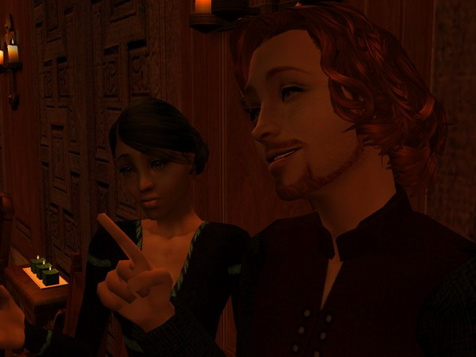
Condal’s first apology swelled into an explosive second. “Ach! Good sir!” she gasped, embarrassed for her sisters’ sakes as well as her own. “I’m ever so sorry!”
He laughed warmly and leaned his shoulder against the wall – not shyly, as she leaned, but easily, as some men sat and put up their feet.
“I was… was wise to tell you from the start,” he smiled. “I won’t have to hear what you’re truly thinking of me.”
“Ach, no!” she protested. “I would never make fun…”
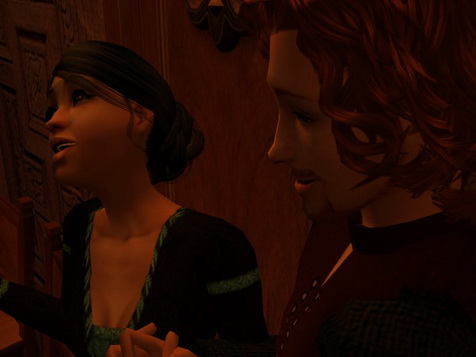
He shook his curly head. “I know you wouldn’t, Connie. I’m only… only… tricking–teasing,” he corrected hastily. At last a sign of awkwardness spread over him in the form of a startlingly pink blush.
Condal relaxed, her own shyness eased by her solicitude for his. “You speak it handsomely, but it isn’t your mother tongue, I’m thinking.”
“It’s my grandmother tongue,” he grinned. “My Mammie was a Scotswoman, like to you.”
Gentle as she was, there was one domain in which even Condal felt it her duty to tease. She leaned her shoulders back against the wall and pretended to lift her nose in scorn.

“Not quite like unto me,” she said slyly. “I’m thinking you’re of Congalach’s clan, with the red hair of you.”
“Ahhh but Mammie had yellow hair like straw,” he chuckled. “I’m not knowing my grandfather’s clan, but Congalach’s it may be, by Mama’s red hair. He didn’t ask Mammie’s leave to be my grandfather, if you’re knowing what I mean.”
He said it so simply and so unashamedly that Condal thought she could not have understood. After a moment she peeked up at him. His face was thoughtful, and his green eyes looked out into the room, but he still leaned easily against the wall, seeming at first glance unperturbed.
However, something about the angle of his chin and the high tilt of his opposite shoulder seemed to be sheltering her. His eyes were watchful, scanning the faces of the people around her – or perhaps only of the men, for they were so many.
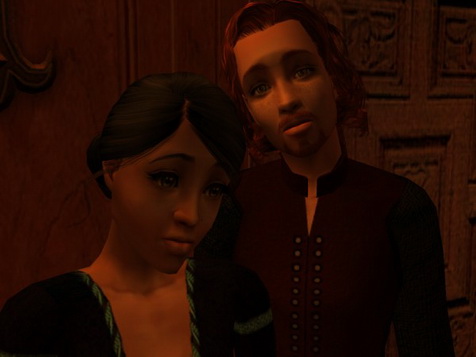
Condal squeaked, “I…”
He looked down at her just as she looked up at him. With their backs against the wall, they stood closer than she would ever have dared face-to-face. When they looked at one another, the distance between them was little more than their difference in heights. Beside him Condal felt very small, but beneath him not small enough. She looked away.
“I shouldn’t have said it,” he murmured above her ear. “Only I must be finding my every word in things Mammie used to say, and I’ve not thought so much on her in so long.”
“Ach, I’m not minding,” Condal said shyly.
“It’s the backwards meeting, we’re having, Connie. Seems we’re getting the… the awkward matters out of the way first. I’ll be getting around to ‘How do you do?’ just before I leave.”

The warm easiness of his voice had already smoothed the awkwardness away. Condal giggled.
“But Mammie wasn’t truly like to you, Connie. She had a hard life, and it made her hard. After the man who was my grandfather went out, she picked her own self up, and… and… how do you say… straightened her skirts, and sat her back down at her loom. And when Mama would be coming, Mammie bore her babe all alone, and wrapped her in a sack, and sat herself back down at her loom the very next morning. Mammie said she cried twice in all her life: once when she was born, and once when Mama died.”
The wistful pride in his voice made the laughter and chatter elsewhere in the room seem shrill. Its warmth set them apart somehow, like a curtain.

“How brave she was,” Condal said softly. Only that morning she had cried when she had awoken and seen that the sleeping body beside her was only Gwynn’s. She cried almost every day.
“Aye, Connie, she was. It was she taught me how to be a fine, brave man, for the father of me was always out to sea. She was father and mother to Mama, and a bit of a father to me too. It was Mammie had the whipping of me,” he chuckled.
Condal leaned her head into the warm shadow of his and sighed, “Poor Mammie…”

In her mind she saw her: the young girl with her yellow hair like braided straw; the hard line of her mouth, which had never been taught to smile; the strong fingers with their calluses like grooves from passing the shuttle over and under through the threads…
And the big, terrible, red-headed man who had burst into her little cottage one afternoon, and who had lifted her up from the stool before her loom, and thrown her down on a pile of sacks, and pushed her skirts up around her hips…
“Would you like to be sitting down?” the Captain asked her gravely.

Condal squeaked and started. She was in the Duke’s hall in Lothere, and her hair was black, and the hems of her skirts neatly brushed the tips of her new, hard-soled little shoes, and the big, red-headed man beside her was not so very terrible. She had let her imagination run away with her again.
Frantically she cast about in her mind for something clever to say.
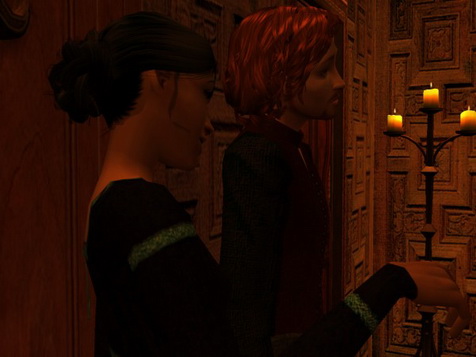
“Did you ever see the sea, then?” she blurted.
The Captain leaned easily back against the wall and smiled. “See it! It used to come up to the gate twice a day to see me!”
“It did?” she gasped.
“With the tide, Connie,” he winked. “I grew up at the shore.”
“You did?”
“I did.”
“Oh! Were you ever – were you ever walking on the shore and looking for stones?”

“Usually the stones found me,” he laughed, “by means of the holes in my shoes.”
“No – pretty stones, I’m meaning?”
His laughter faded until he was only smiling down on her in a crinkly way.
“To take home?” she prompted earnestly. “Were you ever finding a pretty green stone, and taking it home, and finding it was plain and ugly when it dried?”

He shook his head. “I wouldn’t know if I had. I can’t see green.”
“You can’t – oh!” she gasped. “I’m so sorry!”
He laughed. “It’s no shame on me. A man who cannot see green makes a fine guard or soldier. We can see far and clear, and spy things other men cannot, by day and by night. It’s a bit of a bother choosing apples, though,” he winked. “They all look the same to me.”
“Oh! But – but what color do you call your eyes?”

“I don’t have a name for it,” he said with mock solemnity, “but I’m hearing told they’re green.”
This, Condal thought, was such strange coincidence that it was beginning to seem a thread dangling from the loom of prophecy.
“But what color are mine?” she whispered.
The crinkles around his eyes fell smooth, and his face sobered into a true solemnity as he studied hers. Condal had remembered too late how excruciating the gaze of a man could be, dipping deeply into her eyes, but it was she who had asked. Her sense of duty held her eyes open, and her embarrassment held her smile wide.
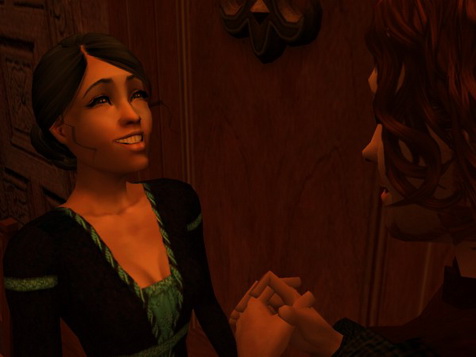
“Are they green, then?” he asked. “I call them the color without a name.”
Condal held her breath and waited to see what would happen. All around her people laughed and shouted at their own jokes and affairs, but no bells rang, no thunder clapped, and no angry little dwarf men hopped out of a crack in the floor to stamp their feet and tug their beards and generally act like sore losers. The Captain only smiled at her with his crinkly, freckly, whiskery smile, as he had before.
“No one can ever say,” Condal tittered breathlessly. “Or rather, everyone says and no one ever agrees. But some say green.”
The Captain cocked his head and nodded. “Maybe that’s why. With that… that… How do you say? With that bothersome green in the way.” He smiled and winked his indisputably green eye at her. “Maybe I’m the only man who can see the true color of Connie’s eyes.”








Here's a picture to give you some idea of how Eadred sees himself.